- Home
- Taylor Caldwell
The Final Hour Page 2
The Final Hour Read online
Page 2
She continued, before he could speak: ‘When Pierre told me they would return to Paris, I tried to replace them for you. Tomorrow, a Belgian couple will come to you for an interview. I understand they are very reliable and expert.’
Ramsdall tried to mollify his friend. He leaned towards him eagerly, and said: ‘Yes, yes. Mrs Bouchard told me about this. She has been very kind, Wolfgang, in trying to replace these two. It was really generous of her. There was no obligation on her part. I understand the Belgians are really excellent—’
The count clenched his fist and struck the arm of his chair with it. It made a dull but curiously violent sound. ‘I am not interested in Madame’s “kindness”,’ he said, brutally, ‘I had planned on Pierre and his wife.’
Mrs Bouchard, with a small choked exclamation, grasped the arms of her chair as if to rise with indignant haste. She said, speaking quickly and sharply, with a slight breathlessness:
‘It may interest you to know, Count, that Pierre’s son, Bernard, was killed in Spain. Captured, then tortured, then murdered by a German officer.’
Her eyes were blue fire; she was very white. Her breast rose on an arch of passionate if repressed feeling. She looked at the count, and her face expressed her deep emotion.
He was taken aback by her look, relapsed into a fulminating silence. Then he said, unpleasantly, with a nasty smile: ‘Ah, Communists, our dear Pierre and Elise! Very interesting. Exceedingly interesting.’
She made a small gesture of disgust ‘Nonsense. You know it is nonsense. If one hates the fascists, must one be a Communist? My husband hates them. I hate them. That is why we are leaving.’ She paused, as if conscious of vulgar impetuousness, of indiscretion and ill-bred impulsiveness. Then her passion overcame her repressiveness, and she continued, more quickly than ever: ‘Will you call me a Communist, Count? Because I hate and despise this corrupt and useless society at Cannes, these parasites, these worthless creatures who connive with every foreign fascist who comes here to seduce the whining privileged from every country in Europe? Am I a Communist because I detest the kept women of French, Spanish, German and English politicians that swarm about this coast? The contemptible creatures who would sell the freedom and honour of their countries for soft beds and safety and the security of bank accounts? If this makes me a Communist, then I am proud to be one!’
They regarded her with amazement. The little cold creature, the exquisite and inhuman little statue, had come to wild and indignant life, filled with ardour and passion. The count almost forgot her words, so intrigued, so excited was he. He saw how her breast trembled, how her hands clenched the arms of her chair so that the fragile knuckles were white, how her eyes glowed with a molten blueness. And she turned those eyes first upon Ramsdall, and then upon von Bernstrom, with disgust and loathing, significant and aware.
‘My dear Mrs Bouchard,’ said Ramsdall, hastily. ‘The count was unfortunate in his choice of words. He doesn’t believe what he said, himself. I am sure you know that he is virtually an exile from Germany, because he can’t endure that—that abominable upstart of an Austrian.’ He coughed, and out of the corner of his eye he glanced at the German. Von Bernstrom saw that glance; it was furious, warning. He bit his lip. ‘I am sure,’ continued Ramsdall, ‘that Wolfgang is entirely in agreement with you. He spoke out of temper.’ The noble peer smiled ingratiatingly at the lady, who had paled excessively, and was very still and silent in her chair. ‘Naturally, he was annoyed at the bad news of losing the best chef in Cannes. Who wouldn’t be? We must allow for his disappointment, my dear Mrs Bouchard. As you know, he intended to give his first dinner party next week in honour of a most distinguished, I might even say, royal, couple, and this disturbs all his plans. A royal couple, in virtual exile,’ he added, with a meaning and significant smile at her.
She lifted her little hand in a scornful gesture. It was an eloquent gesture, and Ramsdall’s full and folded cheeks turned crimson with inner fury. She said, lightly, and softly: ‘Yes, I know that couple. I would not allow them in this house while I was a tenant. They are very good friends of yours, are they not, Count von Bernstrom?’
He answered, with muffled dignity: ‘Indeed, Madame, I am proud to acknowledge it.’
‘I know,’ she said, very gently. Now her eyes were vivid again, full of things too portentous for speech, but completely understanding. And then she sighed, and sank back in her chair, as if exhausted. She was very pale; even her lips had turned white. She appeared ill. After a moment she resumed, and now her voice was drained: ‘The Belgians will satisfy you. However, there is no obligation on your part to accept them.’
The count had recovered from his rage, at least, on the surface. He said placatingly, and with smooth haste: ‘Madame, I am very sorry. I spoke without thinking, I am very grateful. You have been more than kind. I cannot think of anyone else who would have had my welfare in mind to this extent.’
She said, not looking at him: ‘I am sure this—royal couple—will find the cooking to their satisfaction.’
The count overwhelmed her with extravagant protestations of his gratitude. In the meantime, he was mentally adding another item concerning her and her ridiculous husband to a certain dossier which was kept among secret documents in Berlin. He smiled, remembering those items, all concerning the antics of one Peter Bouchard, member of a family with whom the count was very familiar—very familiar indeed. His smile became more amiable and confident, as he expressed, over and over again, his contrition, his gratitude. He saw she was not listening. He was greatly annoyed. He was not accustomed to having women so oblivious of his fascination. She seemed to be involved in thoughts that greatly disturbed, angered, and sickened her.
He said: ‘Though I will not pretend that I am not delighted to be the next tenant in this villa, I should resign it gladly if you, and your husband, dear Madame, would only remain. However, I can assume that Mr Bouchard has now so far recovered his health that he feels he can return to his own country? That is exceedingly happy news.’
She came up from her thoughts and gazed at him with that pure directness which had in it the quality of a child’s regard. ‘My husband feels much stronger, he says. Of course, he has not recovered, can never completely recover, from the injury to his lungs from poison gas during the war. But now he wishes to return home.’ She paused. ‘He feels we must return home. Before the war.’
“‘Before the war”!’ said Ramsdall, with an incredulous smile. ‘My dear child, there’ll be no war.’
‘I have it on the most confidential authority,’ affirmed the count
‘“Confidential authority”?’ murmured Mrs Bouchard. ‘Whose? Hitler’s?’ Her tone was sadly satirical.
The count allowed an expression of distaste to appear on his face. He averted his head with an abrupt movement, as he always did at the mention of that ‘loathsome’ name.
‘Madame,’ he said, stiffly, ‘I must protest. No, my information comes from those who have balanced and very wise minds.’ ‘Nevertheless, there will be war,’ said Mrs Bouchard. She smiled strangely at the count. He saw that smile. His pale brows drew together suspiciously.
‘Your distinguished husband truly believes this?’ he asked. ‘How very depressing for him. It must pain him very much. We all know how he detests and abominates war. His book, The Terrible Swift Sword, the exposé of the armaments industry, the international plotters against the peace of the world, was very popular in Germany. It is still exceedingly popular. My friends in Germany so assure me.’
She was unaccountably, to him, agitated. ‘Count von Bernstrom, I must ask you not to mention that book to my husband today! It upsets him. His whole meaning was distorted. No one understood. It was not only the armaments industry which he intended to expose. That was a minor matter to him. He wished only to draw attention to the sickness of the world, the hatred, the cruelty, the viciousness, of every man in every country. He wished to show that wars are not caused by a single group of men; but by the disease in every
man—everywhere. The armaments industry merely pandered to that insane disease. Catered to it. Without the disease, Peter thinks, there would be no armaments industry. Wars are caused by the hatreds and corruptions in the minds of all men. They are the breakdown of the moral responsibility every man owes to his neighbour. Peter wished to show,’ she continued, her agitation making her incoherent, ‘that wars are the expression of the violence already in existence in men’s hearts. He quoted someone to the effect that war is merely an extension of politics, their most primitive and direct extension, and conclusion. If he hated, and still hates, the armaments industry, it is because that industry is in itself an expression of greed on the part of those men who would profit by the wickedness of all the world.’
The count affected to be bewildered by her rushing words, and uncomprehending. He lifted his hands artlessly, and smiled at her with deprecation. ‘I am afraid I do not follow, dear Madame. It is very confusing. Has not someone said that war is the most natural expression of man? Doubtless, he was wrong, and was attempting to simplify a most complex situation. Nevertheless, there is some reason his remark.’ She was not deceived by his artlessness. ‘Peter says that the intention of Christianity is to sublimate man’s primitive instincts to an awareness of his moral responsibilities. Now, he believes, Christianity has failed. Not because it was wrong, but because it is ignored and perverted. In its most concentrated perversion—clerical fascism in Spain, Italy and France—it has become a horror, a death and a menace to the existence of civilization and democracy.’
Ramsdall listened to her acutely, with a hidden and ominous smile.
‘I am sure,’ he said, soothingly, ‘that those intelligent enough will appreciate Mr Bouchard’s intention. I know I had no difficulty. No difficulty at all. Does Mr Bouchard intend to carry on his work further, upon his return to America?’
She was abruptly still. Then, after a moment, she said, clearly: ‘Yes.’ And she looked at them with the blue shining of her eyes. ‘He will try to tell America what he has learned here, what he has seen, what he knows. Before it is too late.’
The count and Ramsdall exchanged a swift look.
‘But Mr Bouchard has hardly ever stepped from the villa,’ said Ramsdall, tentatively, leaning forward a little so that his chest extended itself over his paunch.
‘He has listened,’ she answered, firmly.
Ramsdall’s mind ran rapidly over the few years during which he had known the Bouchards. He tried to remember every man and woman who had visited them. He felt something sinister in the pattern of those who had been invited. He recalled that at the times he had been present there had been strange people here, also, whom he had detested, of whom he had had reason to be suspicious. He was alarmed. He smiled tolerantly, but said nothing.
An elderly lady, slight and bent, soft of movement, and gentle of expression, stepped onto the terrace. She had a worn and wrinkled face, kind and sad, and large brown eyes full of wisdom. Her hair was smooth and white. She wore black, also, but a hanging and spiritless black. The men rose and bowed. Mrs Bouchard kissed the lady’s cheek with deep affection. ‘How are you, Mama?’ she said, in a sweet tone. ‘Not too tired, I hope, after all that packing?’
She smiled tenderly at her daughter. ‘No, dear. I am quite well.’ She turned and regarded the gentlemen with an expression suddenly very tired and remote, and full of shrinking. She sat down in a chair the count pulled forward for her.
‘We are going to miss you very much, Mrs Bouchard,’ said Ramsdall, gallantly.
‘That is very kind of you, indeed,’ she murmured. She looked at him steadfastly, with those full brown eyes of hers, so simple, so intelligent, so ingenuous. For some reason he felt a heat rising about his thick throat.
She turned to her daughter. ‘It is almost twelve, dear. I haven’t seen Peter this morning. He is well?’
‘Yes, Mama,’ replied young Mrs Bouchard. ‘He has been up since eight. Baron Opperheim is with him now. They have been together since ten.’
The count moved slightly. ‘I beg your pardon, Madame. You said: “Opperheim”?’
‘Yes, Count. They are great friends, you know, and have been, for five years. The baron comes here very often.’
The count’s parched countenance remained smooth and only politely interested. ‘Of course. It was stupid of me to forget.’ He smiled with pleasure. ‘The baron and I have much to say to each other. I have not seen him for a month. When I called for him this morning, I was told he had already left his hotel.’
‘He has been in Paris,’ said young Mrs Bouchard, indifferently.
Old Mrs Bouchard said nothing. She looked slowly from the count to Lord Ramsdall. Only she saw the swiftness of their exchanged glances. She shivered.
She could not bear to look at these two any longer. Her gaze wandered over the terrace, barred and dappled with sunlight. She looked beyond, to the blue brilliance of the sea. She heard its soft and whispering sound, saw the light of the wings of the doves that circled the gulf. Far out, a white sail divided the water from the pure incandescence of the noonday sky. There was a faint rustling of leaves in the air, the warm scent of grass and salt and flowers. How peaceful it was, how gentle and serene. Her body felt very cold, and ancient.
She turned her mournful brown gaze to her daughter. She saw the worn fixity about the beautiful blue eyes and the deep corners of the lips of Celeste Bouchard. And her heart was torn with a grief too deep for words, for thought, or even for tears.
CHAPTER II
The wind came in on waves of radiant light through the open windows. Here, one could see the immense and glittering azure of the ocean, the wet brown rocks on which the villa perched, the scythe-like sweep of the gulls against the pure and passionate sky of France. The peace and shimmering brilliance of the noonday pervaded the serene air like a benediction. From these windows, there was no sign of the feverish and decadent life of Cannes, nothing but the wash of waves, the cries of the gulls, the soft rustling of the wind.
There was silence in the room. The pale and lofty walls and ceiling sparkled with shadowy brightness. There was a dancing reflection upon the cool dim floors, the edges of simple but perfect dark furniture, the bowls and vases of flowers scattered about on the tables and on the fireplace. In a far corner was a canopied bed, turned down, as if waiting. But near the windows, looking out upon the summer radiance and serenity, sat two men, in utter quietness.
But it was not the quietness of peace, tranquillity or calm meditation. Things had been said, in a hushed voice, and behind them they had left an aura of bitter violence, of despair, of hopelessness and impotent sorrow. The younger man lay on a chaise-longue, a light shawl over his emaciated knees. His head rested on a plump pillow, and his face was turned to the windows. And that face was white and still, as quiet as the death which never seemed far from him. He was a man in his early forties, his colouring fair and pale, his light hair smooth and faded. His face, so ominously gaunt, appeared formed of the most frail but strangely strong angles, jutting or sunken, the bones sharply visible under the thin flesh. It was a gentle face, severe, sad, reflective, and full of intense intellect and mournfulness. His attitude revealed profound exhaustion, but also a spirit which would not allow his dying flesh to rest, so imbued was it with passion and indomitable courage and endless grief. His hands, emaciated, but fine and narrow, lay on the shawl, and though he had said nothing for a long time, the fingers flexed, trembled, convulsively clenched under the impetus of his tumultuous thoughts. The eyes that looked out upon the sea were strongly blue and pellucid, full of valour and fearlessness, and, now, burning with frantic misery.
The man who sat near him was much older. He was a very little man, brown, dry, shrivelled, with a tiny grey goatee and a bald head. His expression, whimsical and bitter, but kind and resigned, reflected itself in his large brown eyes as they fixed themselves upon the younger man. There was a quietness about him, a thoughtfulness, a sense of great wise age, which contrasted thems
elves remarkably with the agonized prostration implicit in the attitude of the other. He thought: They never accept, these Gentiles. They clamour, grow tempestuous, and out of their despair they abandon everything. That is because they live in the circle of the today, the bubble of Now. Beyond them, they cannot see the past or the future. Who can endure without a sense of yesterday and tomorrow? Despair is the prerogative of the child, but the stupidity of the man. I am desolate, yes. Ruined, true. I see no hope for myself. But I do not despair. Of what importance am I? The tomorrow is not for me. And life outwits tomorrows, inevitably, world without end. Why cannot my dear friend understand that? He is engrossed with today. He sees in it the shape of all the tomorrows. But today, though it is exceedingly dreadful, and throws its bloody shadow on the future, carries in it a hope also for the future. Man dies, but mankind persists. But these Gentiles believe that each individual man’s agonies are the world’s agonies; his death, the world’s death. They are bounded by their narrow flesh. We, at least, have the larger vision of humanity, its diversity, its bounding recovery from anguish, the distant light from other suns shining upon its face. I perish, but my brother shall live.
The young man stirred slightly on his pillows. He said, in a faint voice, in German: ‘It is not to be endured, Israel. Not to be endured!’ And now his voice rose in a thin cry. He lifted his worn hands and clasped them together with a suppressed convulsion. ‘What can I do? What can anyone do?’
Baron Opperheim regarded his friend with deep compassion. He rubbed the side of his Phoenician nose, and coughed gently. He murmured something. The young man turned his face towards him. The baron spoke louder. ‘I was quoting a passage from Goethe’s Egmont. You remember the cry of Ferdinand?: “Must I stand by, and look passively on; unable to save thee, or to give thee aid! What voice avails for lamentation! What heart but must break under the pressure of such anguish?”’
The young man was silent. But his eyes fixed themselves with deathly and weary intensity upon the other. His hands clasped themselves together.

 Testimony of Two Men
Testimony of Two Men Wicked Angel
Wicked Angel The Arm and the Darkness
The Arm and the Darkness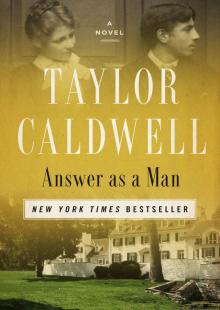 Answer as a Man
Answer as a Man Grandmother and the Priests
Grandmother and the Priests On Growing Up Tough: An Irreverent Memoir
On Growing Up Tough: An Irreverent Memoir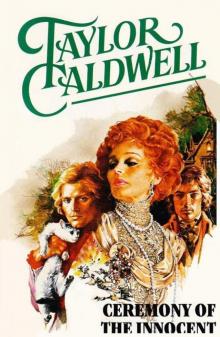 Ceremony of the Innocent
Ceremony of the Innocent The Listener
The Listener Bright Flows the River
Bright Flows the River The Earth Is the Lord's
The Earth Is the Lord's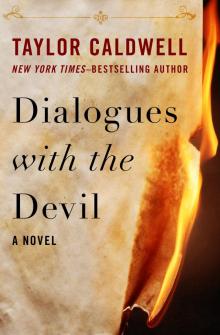 Dialogues With the Devil
Dialogues With the Devil A Tender Victory
A Tender Victory This Side of Innocence
This Side of Innocence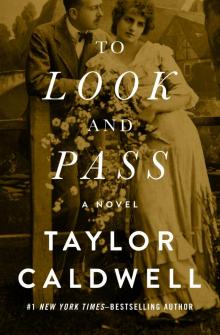 To Look and Pass
To Look and Pass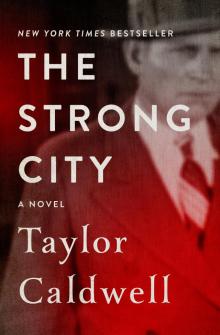 The Strong City
The Strong City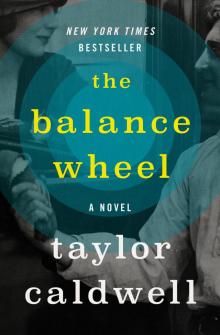 Balance Wheel
Balance Wheel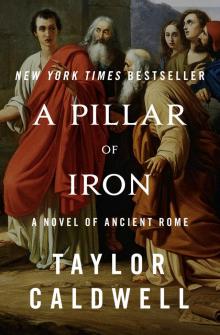 A Pillar of Iron: A Novel of Ancient Rome
A Pillar of Iron: A Novel of Ancient Rome Glory and the Lightning
Glory and the Lightning Dear and Glorious Physician
Dear and Glorious Physician The Wide House
The Wide House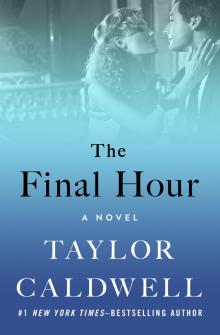 The Final Hour
The Final Hour Never Victorious, Never Defeated
Never Victorious, Never Defeated Unto All Men
Unto All Men The Turnbulls
The Turnbulls Your Sins and Mine: The Terrifying Fable of a World Without Faith
Your Sins and Mine: The Terrifying Fable of a World Without Faith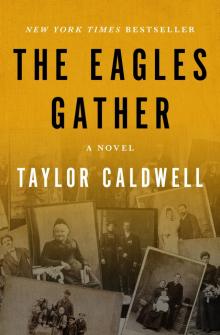 The Eagles Gather
The Eagles Gather Let Love Come Last
Let Love Come Last The Devil's Advocate: The Epic Novel of One Man's Fight to Save America From Tyranny
The Devil's Advocate: The Epic Novel of One Man's Fight to Save America From Tyranny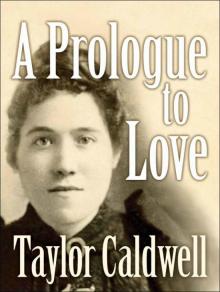 A Prologue to Love
A Prologue to Love Maggie: Her Marriage
Maggie: Her Marriage The Late Clara Beame
The Late Clara Beame Melissa
Melissa Great Lion of God
Great Lion of God Captains and the Kings
Captains and the Kings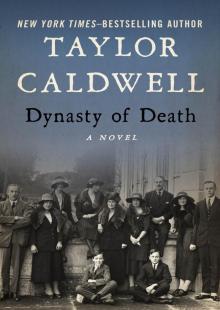 Dynasty of Death
Dynasty of Death No One Hears but Him
No One Hears but Him The Sound of Thunder
The Sound of Thunder There Was a Time
There Was a Time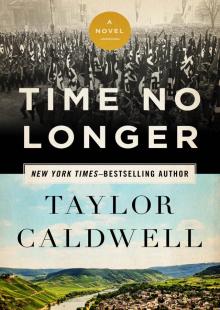 Time No Longer
Time No Longer I, Judas
I, Judas The Devil's Advocate
The Devil's Advocate The Romance of Atlantis
The Romance of Atlantis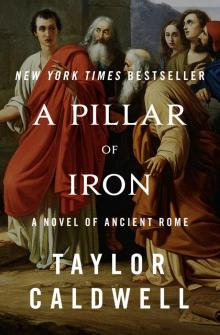 A Pillar of Iron
A Pillar of Iron On Growing Up Tough
On Growing Up Tough Your Sins and Mine
Your Sins and Mine